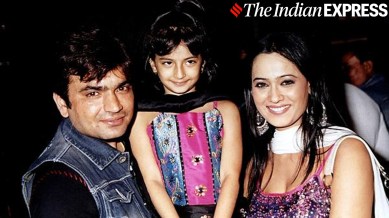📣 For more lifestyle news, click here to join our WhatsApp Channel and also follow us on Instagram
‘Where is equality’: Raja Chaudhary declares Shweta Tiwari ‘anpadh’, blames her for keeping him away from their daughter Palak; expert on how this narrative is harmful
Raja Chaudhary also said, “Padhai likhai tumne ki nahi hai, anpadh tum vaise ho, jhoote duniya jee rahe ho, toh jab aap kaam karne lagte ho toh the person doesn't remain the same.”

Money, parenting and power often become contested topics when relationships break down. Actor Raja Chaudhary, who was previously married to Shweta Tiwari, opened up about their divorce and made several pointed remarks about finances, education and parental roles.
In an interview with Hindi Rush, Raja said, “Tumne paise dekhe nahi, bachpan se tumne gareebi ki zindagi ji hai, chawl main rahe ho, achanak se jab paise aaye toh dimaag kharab hojaata hai logon ka (You hadn’t seen money before, you lived a life of poverty since childhood, grew up in a chawl. When money suddenly comes, it messes with people’s minds).
monthly limit of free stories.
with an Express account.
In the same interview, he went on to say, “Aadmi toh kabhi nahi kehta yeh mera paisa hai. Aurat ka paisa aurat ka paisa hogaya, ajeeb natak hai. Fir baatien hongi ki kandhe se kandha milake chalenge, barabari karenge, abey kahan ho barabari ke layak? Chaar rupay dekhke tumhari neyaat badal gayi (A man never says, ‘This is my money.’ But when it comes to a woman’s money, it suddenly becomes ‘a woman’s money.’ What a strange drama this is. Then there’s talk of walking shoulder to shoulder, of being equals. But where is the equality? Just the sight of a few rupees changed your intentions) .”
He also stated, “Padhai likhai tumne ki nahi hai, anpadh tum vaise ho, jhoote duniya jee rahe ho, toh jab aap kaam karne lagte ho toh the person doesn’t remain the same (You are an illiterate, living in a sham of a world. So when you finally start working, you’re no longer the same person).” When asked if Shweta was earning more than he did, he said, “I was working too, but does that even matter? A man earns his whole life — the day a woman earns, she feels it was her money.”
During the same interview, Raja reflected on his estranged daughter Palak, saying, “Resolving an issue or not is secondary, what is important is that, as humans, we need to have at least one conversation about the issue. Instead of creating that opportunity, Shweta brutally decided to take my daughter away from me. This is not right. She did this because she was more influential and powerful.”
For the unversed, Shweta and Raja were married in 1998 and welcomed their daughter, Palak, in 2000. However, the marriage eventually turned sour and Shweta filed for divorce, citing issues such as alcoholism and domestic abuse, in 2007.
Impact of discrediting a woman’s financial independence or education
Counselling psychologist Athul Raj tells indianexpress.com, “When a man publicly calls his ex-wife illiterate or questions her financial autonomy, he’s not just undermining her — he’s reinforcing a centuries-old script: that a woman’s worth is secondary, her voice less valid, her success conditional.”
In therapy, he says, “we often see this pattern post-separation. A woman begins to rebuild — emotionally, financially — and suddenly, her competence is up for debate. She’s labelled arrogant, lucky, undeserving, or in this case, uneducated. This is not feedback; it’s control in disguise.”
From a societal lens, these statements are dangerous. They perpetuate the myth that women can only succeed with male guidance. It reinforces to countless others that a woman’s independence is fragile — conditional, revocable, and still up for male judgement. Equality in relationships isn’t just about splitting bills or raising kids. It’s about respecting each other’s evolution, notes the expert.
In high-conflict separations, how should parenting responsibilities and credit for a child’s development be viewed or divided?
Raj states, “It’s important to understand that parenting is made up of two layers: logistical and emotional. One parent may have done the financial planning, but the other may have built the child’s emotional world. That invisible labour is often overlooked in public discourse. It doesn’t get headlines, but it shapes the child’s core sense of self.”
Credit, in parenting, is a distraction, says Raj, adding, “What the child needs is coherence. A united front, even in separation. If that’s not possible, then at least a ceasefire — a refusal to use the child as a scoreboard. Because when parents fight for credit, the child becomes the battleground.”
📣 For more lifestyle news, click here to join our WhatsApp Channel and also follow us on Instagram